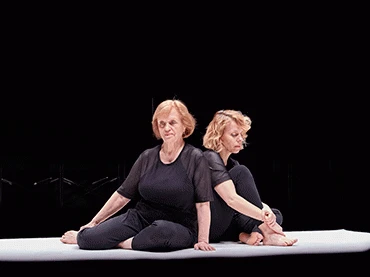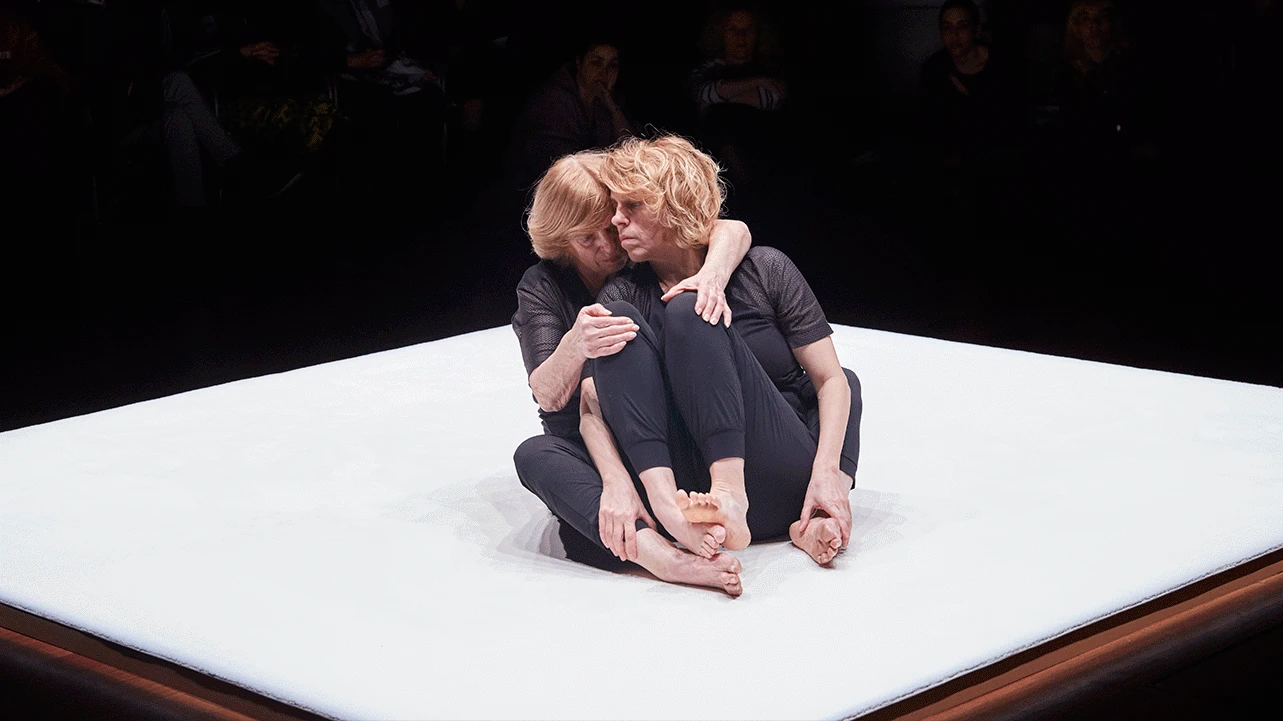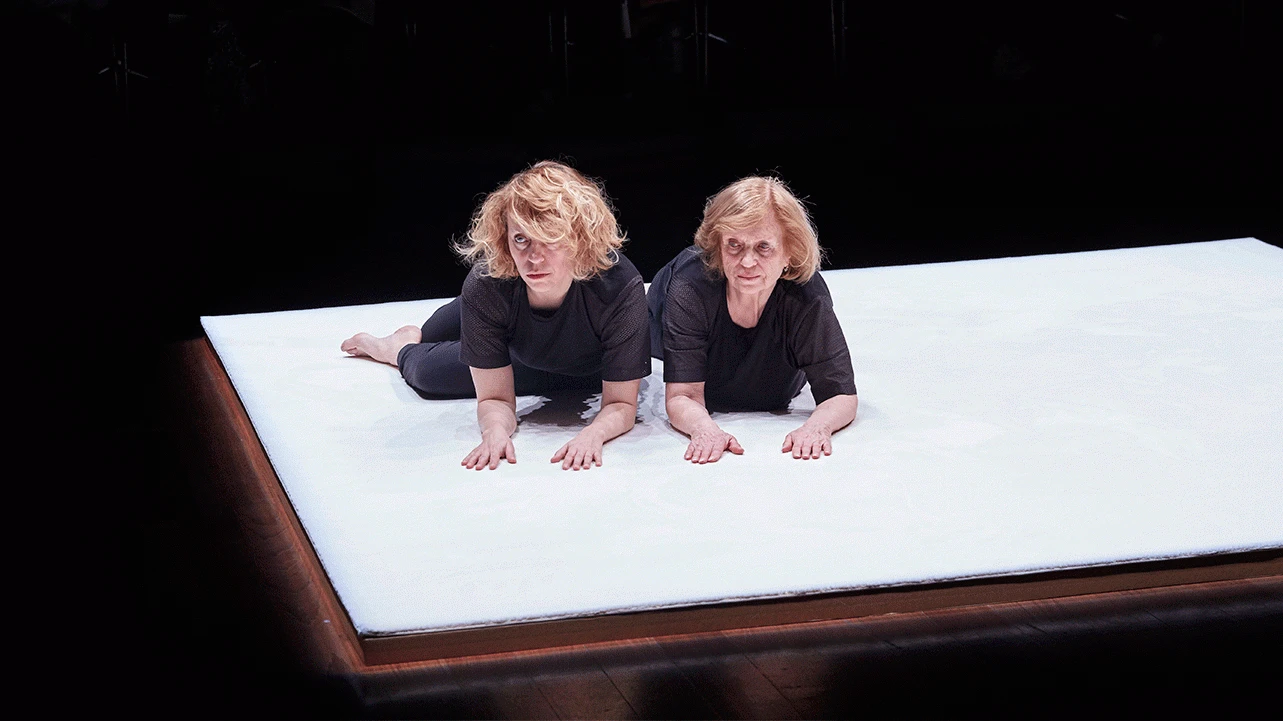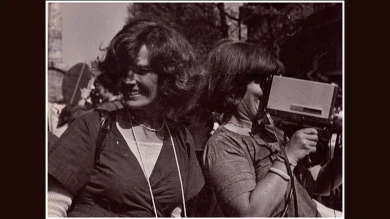
Eszter Salamon, Monument 0.7: M/Others, at Museo Reina Sofía, 2020. Photo: Joaquín Cortés/Román Lores © Museo Reina Sofía
Held on 19 Feb 2020
In a dialogue with the exhibition Defiant Muses. Delphine Seyrig and the Feminist Video Collectives in France in the 1970s and 1980s, curated by Nataša Petrešin-Bachelez and Giovanna Zapperi, Museo Reina Sofía presents Monument 0.7: M/Others (2019), by choreographer Eszter Salamon.
In 2018, the curatorial and editorial platform If I Can’t Dance I Don’t Want To Be Part Of Your Revolution, from Amsterdam, together with researcher and curator Nataša Petrešin-Bachelez, invited Salamon to conceive a performance that would converse with the unfinished project of the actress, video artist and feminist activist Delphine Seyrig (1932–1990): a silent black-and-white film she started in the 1980s, entitled Calamity, and based on the letters Calamity Jane (1852–1902), a well-known frontierswoman and pioneer of the Wild West, wrote to her daughter Jean McCormick (1873–1951).
The response to such an invitation comes in the form of Monument 0.7: M/Others, which is, in turn, the seventh utterance in the series Monuments, which Salamon started in 2014. Conceived as a long-term project addressing the plurality of formats and durations, the series constitutes an approach to different figures from the history of dance and art, such as the dancer, artist and actress Valeska Gert (1892–1978) or the dancer and actress Valda Setterfield (1934). It does not aim, however, to serve as an homage, but instead looks to set forth different ways of approaching the history of the movement to bring it into the present, incorporating issues related to identity, memory and authenticity.
The piece will be followed by a conversation with the artist, presented and moderated by Isabel de Naverán.
Curatorship
Isabel de Naverán
Force line
Action and radical imagination
Organised by
Museo Reina Sofía
Participants
Erzsébet Gyarmati is a Physical Education and Biology teacher, dance instructor and education expert. Fifty years ago, she began to engage with Hungarian folk dance, teaching and performing to make the genre become part of basic education in Hungary. With her students, she founded the Szàzszorszép Dance Ensemble, a company which recently celebrated its fortieth anniversary. She was also founder and director of the Martonvàsàr School of Arts, Hungary, from 1993 to 2000. From 1994 to 1997, she participated as Hungarian coordinator of MUS-E, a music and education project Yehudi Menuhin carried out in nine countries, with the aim of promoting creativity and tolerance through the arts. She is the author of different books on Hungarian folk dance education, for instance Games and Dance in School I-IV (2001). Furthermore, in 2005 she was part of Eszter Salamon’s piece Magyar Tàncok, performing in a number of countries.
Eszter Salamon is a choreographer, artist and performer who lives between Berlin, Paris and Brussels. She uses choreography as an activating and organising agency between different languages, such as image, sound, music, text, voice and body movements. Her work evolves via different formats, aesthetics, methodologies and poetics, setting in motion a wide spectrum of expressions. Since 2002, she has created solos and larger-scale works, which have been performed internationally at festivals, arts venues and museums, for instance Festival d'Automne à Paris, Avignon Festival, Ruhrtriennale / PACT Zollverein in Germany, the Holland Dance Festival, the Centres Pompidou in Paris and Metz, The Kitchen and MoMA in New York, HAU Hebbel am Ufer Berlin, The Place in London, the Serralves Foundation in Porto and the Cartier Foundation in Paris, among others. Since 2014, she has been working on a series of pieces that seek to rethink the idea of monument and, in the words of the artist, “re-hallucinate” history. In this series of works in different formats, durations and forms of presentation, memory is invoked to assemble the ghosts of identity, authenticity and origin. Eszter Salamon is artist-in-residence in Théâtre Nanterre-Amandiers. She is the laureate of the Evens Art Prize 2019.
Cast and credits
Concept and artistic direction: Eszter Salamon
Choreography and performance: Erzsébet Gyarmati and Eszter Salamon
Scenography: Sylvie Garot and Eszter Salamon
Lighting design: Sylvie Garot
Rehearsal assistance: Liza Baliasnaja and Boglàrka Börcsök
Costume: Sabin Gröflin
Commission: Nataša Petrešin-Bachelez and If I Can’t Dance I Don’t Want To Be Part Of Your Revolution (Amsterdam)
Production: Botschaft GbR / Alexandra Wellensiek and Studio E.S / Elodie Perrin
Co-production: If I Can’t Dance I Don’t Want To Be Part Of Your Revolution (Amsterdam), Project Arts Centre (Dublin) and Ménagerie de verre (Paris)
Support: Senate Department of Culture and Europe, Berlin; Regional Directory of Cultural Affairs, Paris — French Ministry of Culture and Communication and NATIONALES PERFORMANCE NETZ (NPN); Co-production Fund for Dance, funded by the Federal Government Commissioner for Culture and the Media
In cooperation with: Tanz im August Berlin and Kultur Büro Elisabeth
Acknowledgements: Susan Gibb, Ferenc Salamon, Lili Kárpáti and Uferstudios
Excerpt: Composition as Explanation (1926), by Gertrude Stein



Más actividades

Difficulty. Forms and Political Effects of Deviation in Writing and Contemporary Art
23 February – 14 December 2026 – Check programme
Difficulty. Forms and Political Effects of Deviation in Writing and Contemporary Art is a study group aligned towards thinking about how certain contemporary artistic and cultural practices resist the referentiality that dominates the logics of production and the consumption of present-day art. At the centre of this proposal are the concepts of difficulty and deviation, under which it brings together any procedure capable of preventing artistic forms from being absorbed by a meaning that appears previous to and independent from its expression. By ensuring the perceptibility of their languages, difficulty invites us to think of meaning as the effect of a signifying tension; that is, as a productive and creative activity which, from the materiality of art objects, frees aesthetic experience from the representational mandate and those who participate in it from the passiveness associated with tasks of mimesis and decoding.
The economy of the referential norm translates the social logic of capitalism, where insidious forms of capturing subjectivity and meaning operate. In the early 1980s, and adopting a Marxist framework, poet Ron Silliman highlighted how this logic entailed separating language from any mark, gesture, script, form or syntax that might link it to the conditions of its production, rendering it fetichised (as if without a subject) and alienating its users in a use for which they are not responsible. This double dispossession encodes the political strategy of referential objectivity: with no subject and no trace of its own consistency, language is merely an object, that reality in which it disappears.
The political uses of referentiality, more sophisticated today than ever before, sustain the neoliberal-extractivist phase of capitalism that crosses through present-day societies politically, economically and aesthetically. Against them, fugitive artistic practices emerge which, drawing from Black and Queer studies and other subaltern critical positions, reject the objective limits of what exists, invent forms to name what lies outside what has already been named, and return to subjects the capacity to participate in processes of emission and interpretation.
Read from the standpoint of artistic work, the objective capture of referentiality may be called transparency. Viewed from a social contract that reproduces inequality in fixed identity positions, transparent in this objectivity are, precisely, the discourses that maintain the status quo of domination. Opposite the inferno of these discourses, this group aims to collectively explore, through deviant or fugitive works, the paradise of language that Monique Wittig encountered in the estranged practices of literature. For the political potency of difficulty — that is, its contribution to the utopia of a free language among equals — depends on making visible, first, its own deviations; from there, the norm that those deviations transgress; and finally, the narrowness of a norm which in no way exhausts the possibilities ofsaying, signifying, referring and producing a world.
From this denouncement of referential alienation, fetishisation and capture, Difficulty. Forms and Political Effects of Deviation in Writing and Contemporary Art turns its attention to the strategies of resistance deployed by contemporary artists and poets. Its interest is directed towards proposals as evidently difficult or evasive as those of Gertrude Stein, Lyn Hejinian, Theresa Hak Kyung Cha, Kameelah Janan Rasheed, Kathy Acker, María Salgado and Ricardo Carreira, and as seemingly simple as those of Fernanda Laguna, Felix Gonzalez Torres and Cecilia Vicuña, among other examples that can be added according to the desires and dynamics of the group.
The ten study group sessions, held between February and December, combine theoretical seminars, work with artworks from the Museo Reina Sofía’s Collections and exhibitions, reading workshops and public programs. All these formats serve as spaces of encounter to think commonly about certain problems of poetics — that is, certain political questions — of contemporary writing and art.
Difficulty. Forms and Political Effects of Deviation in Writing and Contemporary Art inaugurates the research line Goodbye, Representation, through which the Museo Reina Sofía’s Studies Directorship seeks to explore the emergence of contemporary artistic and cultural practices which move away from representation as a dominant aesthetic-political strategy and redirect their attention toward artistic languages that question the tendency to point, name and fix, advocating instead for fugitive aesthetics. Over its three-year duration, this research line materializes in study groups, seminars, screenings and other forms of public programming.

CLINIC 2628. A Community of Writing and Research in the Arts
February – October 2026
Clinic 2628 is a project which supports and brings together writings which stem from the intention to offer a space and sustainable time for research work in art and culture. Framed within an academic context which is increasingly less receptive to the forms in which thinking happens and is expressed, the aim is to rescue the academic from its neoliberal trappings and thus recover the alliance between precision and intuition, work and desire. A further goal is to return writing to a commons which makes this possible through the monitoring of processes and the collectivisation of ideas, stances, references and strategies.
The endeavour, rooted in a collaboration between the Museo Reina Sofía’s Studies Directorship and the Artea research group, via the i+D Experimenta project, is shaped by three annual editions conceived as spaces of experimentation, discussion and a demonstration of writings critical of what is put forward by today’s academia.
What forces, forms and processes are at play when writing about art and aesthetics? In academia, in museums and in other cultural institutions, the practice of writing is traversed by productivist logics which jeopardise rhythms of research and experimentation. The imposition of both scientism inherent in the structure of “the paper” and the quantifying of results which demand a criterion of quality and visibility sterilise and smoothen, from the outset, the coarseness that is particular to writing understood from the concrete part of language: phonic, graphic, syntactic and grammatical resistance connecting the language user to the community the language unites and activates. They also sterilise the roughness enmeshed in the same desire to write, the intuitive, clear and confusing pathways that once again connect the writer to those reading and writing, participating in a common good that is at once discovered and produced.
The progressive commercialisation of knowledge propelled by cognitive capitalism moves further away from the research and production of knowledge in artworks and artistic languages and practices. The work of curators and archive, criticism, performances and essays formerly saw a horizon of formal and emotional possibilities, of imagination that was much broader when not developed in circumstances of competition, indexing and impact. Today, would it be possible to regain, critically not nostalgically, these ways; namely, recovering by forms, and by written forms, the proximity between art thinking and its objects? How to write in another way, to another rhythm, with no more demands than those with which an artwork moves towards different ways of seeing, reading and being in the world?

Cultural Work
Thursday, 12 February 2026 – 5:30pm
This series is organised by equipoMotor, a group of teenagers, young people and older people who have participated in the Museo Reina Sofía’s previous community education projects, and is structured around four themed blocks that pivot on the monstrous.
Session number two looks to approach film as a place from which cultural work is made visible and processes of production engage in dialogue with artistic creation. From this premise, the session focuses on exploring how audiovisual content is produced, assembled and distributed, from the hands that handle the images to the bodies that participate in its circulation. The aim is to reflect on the invisible effort, precarity and forms of collaboration that uphold cultural life, that transform the filmic experience into an act that recognises and cares for common work.

Alberto Greco. Viva el arte vivo
Tuesday, 10 February 2026 – 7pm
In conjunction with the opening of the exhibition Alberto Greco. Viva el arte vivo, Fernando Davis, the show’s curator, and Amanda de la Garza, the Museo Reina Sofía’s deputy artist director, will converse in the Nouvel Building’s Auditorium 400 on the life and work of the Argentinian artist, a core figure in experimental avant-garde art.
The title of both exhibition and conversation originates from the proclamation “Long Live Arte Vivo” Alberto Greco (Buenos Aires, 1931— Barcelona, 1965) disseminated around the streets and on the walls of Rome. For Greco, arte vivo was an art of the future, an art based on a set of irreverent and untimely gestures, of adventures open to unpredictability melding with life, and which began in 1962, prior to his coining of the term “vivo-dito”. In his Manifiesto dito dell´arte vivo (Dito Arte-Vivo Manifesto), which he pasted on the walls of Genoa, Greco encouraged new contact “with the living elements of our reality: movement, time, people, conversations, smells, rumours, places, situations”. He would also burst into the everyday of Madrid’s streets as he convened a “vivo-dito moment”, culminating in the burning of a canvas painted collectively in Madrid’s Lavapiés neighbourhood.
In addition to founding arte vivo, Alberto Greco was an informalist painter, a queer flâneur, a poet and sometime actor. This intense journey of Greco’s life and art is closely connected to the migrant route he embarked upon in 1950 in Buenos Aires, taking in Atacama and Humahuaca, Paris, Rio de Janeiro, São Paulo, Genoa, Rome, Madrid, Piedralaves, New York and Ibiza and ending abruptly in Barcelona, where he took his own life shortly after writing his final great work, the novel Besos brujos (Bewitching Kisses, 1965).
These inaugural conversations, part of the main working strands of the Museo’s Public Programmes Area, aim to explore in greater depth the exhibition narratives of the shows organised by the Museo from the perspective of artists, curators and specialists.
![Basel Abbas y Ruanne Abou-Rahme, At Those Terrifying Frontiers Where the Existence and Disappearance of People Fade Into Each Other [En esas fronteras aterradoras donde la existencia y la desaparición de personas se disuelven entre sí], 2019](https://recursos.museoreinasofia.es/styles/small_landscape/public/Colecci%C3%B3n/abbasabourahme.png.webp)
Gaza and Aestheticide
Tuesday February 10, 2026 – 16:00 h
“This seminar examines the systematic destruction of Palestinian collective sensibility — what we might call ‛aestheticide’ — that has accompanied Israel’s genocide and ecocide in Gaza, and considers the conditions of artistic practice in its aftermath. Over more than two years, the demolition of universities, archives, museums, and libraries has not only erased cultural and intellectual infrastructure but has also targeted the very possibility of representation itself. The destruction of a people has been accompanied by the destruction of their image, their history, and their capacity to be known: reportage, scholarship, and cultural memory have been deliberately undermined, with media institutions, universities, and museums often complicit in this repression. Gaza consequently functions as a rehearsal space for a possible global future — of fascism, post-liberal authoritarianism, militarized borders, and AI-enabled warfare —, a laboratory for an emerging world order. What, then, becomes of critical analysis and resistance under these conditions? And what becomes of aesthetics and politics?”
—T.J. DemosThis seminar takes place thanks to the art historian’s invitation to Spain by the Miró Foundation. In the context of the museum, it engages in dialogue with a broader line of work on the climate emergency and decolonial perspectives developed within the Museum of the Commons project (2023–2026) of the L’Internationale network, of which the Museo Reina Sofía is a member; as well as with some of the questions that animate the study group Aesthetics of Peace and Desertion Tactics. Finally, it is also embedded in a wider strategy of support for and commitment to the artistic and discursive practices of Palestinian artists and cultural practitioners, most clearly reflected in the TEJA network.

